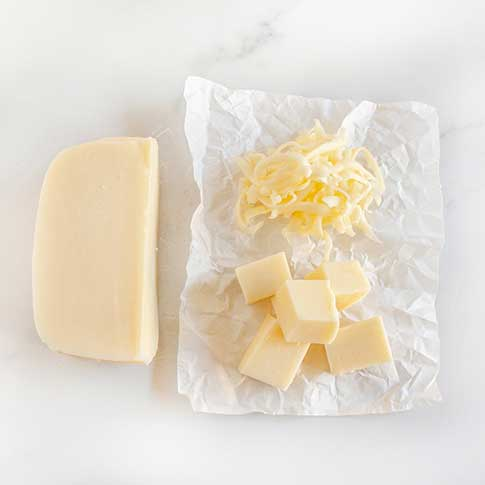Cheese Lovers Debate: Monterey Jack or Colby Jack?
- Madison
- Mar 28
- 3 min read
Cheese lovers, brace yourselves—there’s a world of cheeses out there that’s so vast and diverse, it’s almost overwhelming. Some cheeses are so distinct, they barely feel like the same product, while others, like Monterey Jack and Colby Jack, seem to exist in a world where the differences are subtle yet intriguing. Both of these cheeses are beloved staples of American kitchens, known for their smooth texture, mild flavor, and exceptional melting abilities. But are they really all that different?
At first glance, Monterey Jack and Colby Jack seem pretty interchangeable, right? After all, they’re both mild, semi-soft, and melt beautifully. If you were to toss a slice of either on your grilled cheese, you’d probably not notice much of a difference. But here's the thing: despite their similarities, Monterey Jack and Colby Jack come from different roots and are made in different ways. So, let’s take a closer look at these two cheese superstars and explore their origins and differences.
Monterey Jack: A Cheese with Deep American Roots
Monterey Jack’s story begins in California—way back in the days of Spanish missions. Originally called queso blanco país (country-style white cheese), this semi-soft cheese was created by Spanish missionaries using milk from cattle they brought with them to California. It wasn’t until the U.S. took control of California that Monterey Jack as we know it today started to take shape.
Enter David Jacks, a businessman who saw an opportunity to take over the local cheese industry. In the late 1800s, he bought up land and dairy ranches around Monterey, scaling up the production of this locally made cheese. With his help, queso blanco país became “Jack’s cheese” and later, Monterey Jack.
Today, Monterey Jack is beloved for its creamy, mild flavor and soft, squishy texture. It’s the perfect base for a variety of other cheeses, like Pepper Jack or, of course, Colby Jack.

Colby Jack: A Fusion of American Cheese Traditions
Colby Jack is a bit of a mash-up—a beautiful blend of Monterey Jack and Colby cheese. Colby was created in Wisconsin in 1885 by Joseph Steinwand, who was experimenting with different cheesemaking techniques. The result? A cheese that’s similar to cheddar, but milder, sweeter, and less tangy. One of the key techniques that set Colby apart from cheddar was the washing of curds in cold water, which helped create its softer texture.
So how did Colby Jack come to be? Cheese producers in Wisconsin were already making Monterey Jack, and at some point, they decided to combine it with Colby, and voilà—Colby Jack was born. The marbled appearance comes from the bright orange color of Colby (which is achieved by adding annatto), and the final product is a perfect mix of the buttery richness of Monterey Jack and the slightly sweet, tangy notes of Colby.
What Makes Them Different?
While Monterey Jack and Colby Jack share a lot of similarities in terms of flavor and texture, the key difference lies in their origins and their unique flavor profiles. Monterey Jack is known for its creamy, buttery flavor, while Colby Jack brings a slightly sweeter taste and the visual appeal of the orange-and-white marble. Both cheeses are incredibly versatile, especially in dishes where meltability is key—think quesadillas, nachos, or even the ultimate grilled cheese.
In the end, both Monterey Jack and Colby Jack cater to the American palate’s love for mild, soft cheeses. They’re the perfect cheeses for anyone looking for a creamy, melt-in-your-mouth experience without the sharpness of more mature cheeses like cheddar.
So, the next time you're at the store, you might find yourself standing in front of the cheese aisle, wondering whether to go for Monterey Jack or Colby Jack. While they’re close cousins in the world of cheese, one thing’s for sure: no matter which you choose, you're in for a delicious, melty treat!

.png)





Komentáre